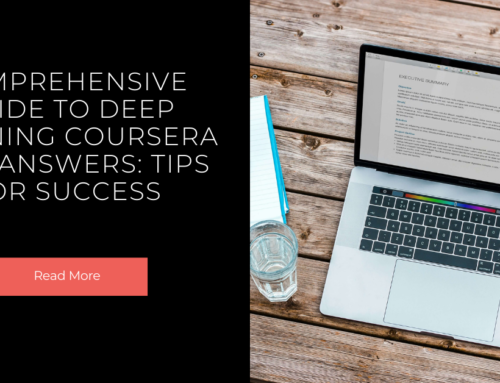Are you facing difficulties with the demanding Deep Learning Coursera Quiz? Many students feel overwhelmed by Coursera’s deep learning challenges, which explore intricate subjects like neural architectures, gradient-based learning, and cutting-edge optimization techniques. These assessments combine theoretical insights with practical coding tasks, creating a unique yet tough experience. Thankfully, by adopting clever tactics and tapping into premium Deep Learning Coursera Answer resources, you can excel in these evaluations and deepen your deep learning skills. This resource provides actionable tips for conquering the Deep Learning Coursera Quiz and accessing trustworthy Deep Learning Coursera Answer solutions.

Unpacking the Framework of the Deep Learning Coursera Quiz
The Deep Learning Coursera Quiz is designed to evaluate your deep mastery of sophisticated subjects, such as convolutional neural networks (CNNs), recurrent neural architectures like LSTMs, and tuning strategies including AdaDelta or momentum-driven techniques. You’ll face a range of question types, from open-ended responses and coding challenges to case-study problems that require applying ideas to real-life scenarios. To prepare well, review the course outline thoroughly and familiarize yourself with the Deep Learning Coursera Quiz’s setup. Understanding its emphasis—whether on coding applications or conceptual analysis—will enhance your preparedness. Check out Deep Learning Coursera Quiz for personalized tips on navigating question formats.

Harnessing Course Resources for the Deep Learning Coursera Answer
Coursera equips you with a treasure trove of materials to uncover the Deep Learning Coursera Answer, including engaging video tutorials, detailed readings, regular assignments, and lively discussion threads. Dive into weekly lessons, focusing on practice sets and real-world examples that echo quiz content. Chatting with fellow learners in forums can spark new ideas and hints for finding the Deep Learning Coursera Answer. Pay special attention to tricky topics like gradient descent, loss functions, or regularization, as they frequently pop up in quizzes. These resources lay a solid groundwork for tackling even the toughest questions.

Building Practical Expertise for the Deep Learning Coursera Quiz
To succeed in the Deep Learning Coursera Quiz, immersive practical training is key. Use Python in combination with tools like TensorFlow to design and enhance deep learning frameworks, emphasizing neural network configurations or course-covered architectures. Take on active projects, such as constructing and tweaking a straightforward convolutional neural network (CNN), to deepen your skills and brace for quiz challenges. Ongoing coding practice—addressing bugs, experimenting with fresh techniques, and perfecting your code—will refine your abilities, making sure you’re thoroughly prepared to ace the Deep Learning Coursera Quiz confidently.

Overcoming Hurdles to Secure the Deep Learning Coursera Answer
Many students hit roadblocks with specific Deep Learning Coursera Answer issues, like understanding overfitting, debugging backpropagation, or interpreting model accuracy. To tackle these, break down complex problems into bite-sized pieces and revisit course videos or exercises for clarity. Joining online study groups or forums can offer fresh perspectives and solutions for finding the Deep Learning Coursera Answer. With persistence and a clear strategy, you’ll conquer these obstacles and thrive in the Deep Learning Coursera Quiz.

Boosting Your Deep Learning Coursera Quiz with TensorFlow and PyTorch
Beyond Coursera, platforms like TensorFlow and PyTorch can supercharge your preparation for the Deep Learning Coursera Quiz. These tools provide rich tutorials, powerful libraries, and flexible frameworks for designing and testing deep learning models, perfectly aligning with course topics. For instance, TensorFlow’s guides can help you implement quiz-related models, while PyTorch’s dynamic features let you explore creative solutions. Pairing these with the Deep Learning Coursera Quiz will give you a clear advantage.

Wrap-Up
Excelling in the Deep Learning Coursera Quiz means blending focused study, real-world practice, and trusted resources. By tapping into Coursera’s offerings and leveraging top Deep Learning Coursera Answer solutions, you’ll be primed for success. Check out CourseraAnswer.com for extra tips and support. Dive in today, apply these strategies, and confidently ace those demanding deep learning quizzes!





